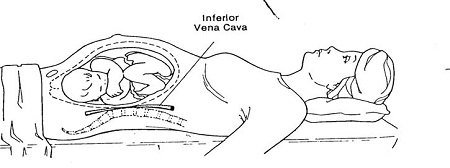We have this question come up a lot in our prenatal exercise classes — should I do exercises while lying on my back while I’m pregnant?
After the first trimester, as the body gets bigger, most women are no longer comfortable lying flat on their backs for long periods of time. Why? Lying on your back puts pressure on a major vein called the vena cava, which can diminish blood flow to your brain and uterus, and can make you dizzy, short of breath or nauseated.

The dizziness or tingling you may feel when you lie on your back is called Supine Hypotensive Syndrome. This is actually a very scary sounding name for a very common, easy-to-remedy situation. By simply changing positions if any discomfort is felt or finding alternate positions to perform certain exercises in, women can completely alleviate this concern. Usually all exercises that are normally done flat on the back can simply be done at a slightly elevated position, such as with a stability ball or large foam wedge, or exercises can be performed in a side-lying position or on all fours. There’s no reason to avoid abdominal work after the second trimester. Just be creative and learn some modified abdominal exercises like Plank, Cat-Cow or use an exercise ball to get in an elevated position.
Some women are comfortable lying on their backs well into their pregnancies, but since this isn’t the case for all women, we suggest that you limit supine or back-lying exercises to 90 seconds at a time. Then you should switch to a side-lying position, all-fours or another position for a different exercise. You can keep coming back to the supine position for exercise, but try to intersperse other exercises in different positions to avoid any dizziness or discomfort.
If you’re doing exercise at home, placing a pillow under your right hip or buttock will allow you to be almost supine without compressing the vena cava.
How to identify Supine Hypotensive Syndrome:
* Dizziness
* Lightheaded
* Feel like you’re underwater
* Seeing spots
* Tingling in legs
If you experience any of these feelings, lie on their left side until symptoms go away.
Supine Hypotensive Syndrome doesn’t hurt the baby. It’s just a signal from your body to change positions. The body is always looking out for the baby’s best interest and will warn you with signs of dizziness, etc., if the vena cava is being depressed. Even when you’re sleeping, if you roll over on your back, your body will wake you up or cue you to get you to turn on your side.





